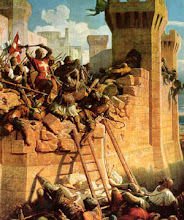While the roots of the movement were complex, a major religious impulse came with the fusion of pilgrimage and holy war. The Crusades continued the old tradition of pilgrimage to the Holy Land that was often undertaken in fulfillment of a vow or as a penance; its earlier designations were via, iter, or peregrinatio. Attractive for pilgrims were not only the holy places themselves but their relics, above all the Holy Sepulcher, to which the emperor Heraclius had restored the True Cross in 627 CE. The finding of the Holy Lance at Antioch (June 1098) revitalized the First Crusade. In the Christian terra sancta mythology the name of Jerusalem ("vision of peace") evoked the image of the heavenly city, the goal of the Christian life (cf. Gal. 4:26, Heb. 12:22, Rv. 21:10–27). As "navel of the world" Jerusalem also figured in apocalyptic expectation; according to the Tiburtine Sibyl, the last battles would be fought and the last emperor hand over his rule to Christ in Jerusalem.
During the twelfth century armed pilgrimages began to be regarded as just wars fought in defense of the Holy Land against its illegitimate occupation by the Muslim infidel. The notion of a just war as revenge for an injury done to Christ had been invoked in the fight against Muslims in Spain and Sicily and, even earlier, in the Carolingian expeditions against pagans and Saracens. In 878, Pope John VIII offered spiritual incentives to those who would arm themselves against his foes in Italy. Gregory VII (1073–1085) envisaged a militia Christi for the fight against all enemies of God and thought already of sending an army to the East. An additional factor was the expectation of religious benefits. In the popular perception, the Crusade indulgence offered nothing less than full remission of sins and a sure promise of heaven. In a feudal society of warriors, crusading for God's sake under the banner of Saint Michael ranked as the ultimate fulfillment of the ideal of Christian knighthood.
Among the political causes of the Crusades, the appeals for help from the Byzantine emperors were prominent. The year 1071 saw the defeat of the Byzantine army at Manzikert in Asia Minor. Jerusalem fell to the Seljuk Turks in 1077. There is no clear evidence that these events led to increased harassment of Christian pilgrims. Nevertheless, they caused great alarm and spurred papal offers of assistance. Moreover, in dealing with the fighting spirit of the aristocracy, reform movements such as the Cluniac and the Gregorian were promoting the "Peace of God" (protection of unarmed persons) and the "Truce of God" (treuga Dei, suspension of all fighting during specified times). In this situation, participation in holy warfare provided an outlet for the martial vigor of Christian knights.
http://find.galegroup.com
Subscribe to:
Post Comments (Atom)


No comments:
Post a Comment